23 Jun 2021 - {{hitsCtrl.values.hits}}
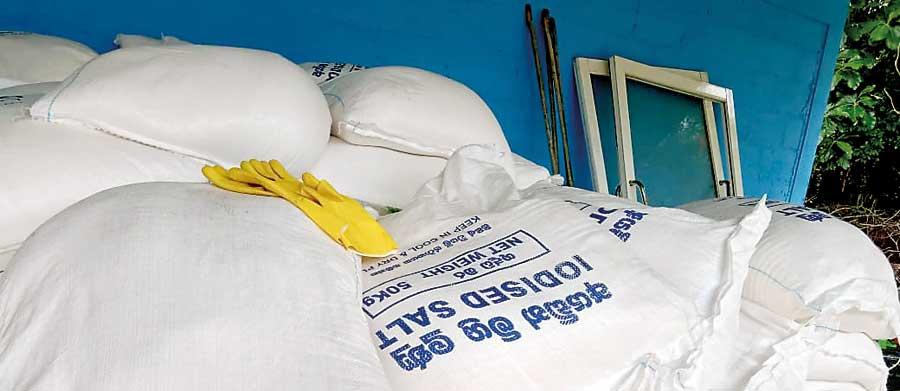
Salt which was found at the storehouse maintained by the close associate of Lanka Salt Ltd Chairman
- The owner of Kalmune K. T. R. Trading Agency acknowledged that table salt stocks were packeted in a storage in Sitinamaluwa as he had no place to do so
- The security logbook in the gate indicates that these youth have visited the Chairman’s official residence on at least for three days of the week
- The owner of Kalmune K. T. R. Trading Agency said that salt billed under his name are packeted at a place in Sitinamaluwa. But that is not possible with the rules followed in the saltern
The media exposed an incident involving the breaking the seal on a lorry loaded with 20 tons of salt dispatched from the Hambantota saltern to Rajan Brothers in Jaffna on June 3 and loading another lorry with the same stock. Following up on a complaint received, the Investigation Officers of the Consumer Affairs Authority, the Internal Audit Division of Lanka Salt Ltd (LSL) and Hambantota Police have initiated investigations. The lorry driver maintained that another lorry was loaded with the stock of salt and dispatched to Jaffna on June 4 as his lorry (42–0645) had broken down. The method to be followed when a lorry transporting salt breaks down or its seal is broken when transferring the stock to another lorry is to inform the Audit Division of LSL and wait for the arrival of officers. However, the lorry driver has broken the seals according to his wishes and transferred the stock. (This newspaper is in possession of video footage to prove the said incident).
dispatched from the Hambantota saltern to Rajan Brothers in Jaffna on June 3 and loading another lorry with the same stock. Following up on a complaint received, the Investigation Officers of the Consumer Affairs Authority, the Internal Audit Division of Lanka Salt Ltd (LSL) and Hambantota Police have initiated investigations. The lorry driver maintained that another lorry was loaded with the stock of salt and dispatched to Jaffna on June 4 as his lorry (42–0645) had broken down. The method to be followed when a lorry transporting salt breaks down or its seal is broken when transferring the stock to another lorry is to inform the Audit Division of LSL and wait for the arrival of officers. However, the lorry driver has broken the seals according to his wishes and transferred the stock. (This newspaper is in possession of video footage to prove the said incident).
"An officer of the LSL Audit Division said that one cannot transfer salt to another vehicle or take salt to another place on the driver’s own discretion"
When the Consumer Affairs Authority (CAA) made inquiries from the driver he has said that he had been following this procedure for 20 years. Accordingly, if a lorry breaks down the seal is removed and the stock is taken to the location in another lorry. An officer of the LSL Audit Division said that one cannot transfer salt to another vehicle or take salt to another place on the driver’s own discretion after a transport receipt stating the weight, size, value, address to be sent, vehicle number have been issued at the saltern. The reasons for drivers removing vehicle seals for a long time should be investigated. The CAA has confirmed through the salt agency in Jaffna that they have only received 10 tons of salt. However Lanka Salt Ltd Chairman Nishantha Sandabarana commenting on a photo posted on Facebook has confirmed that 20 tons have been dispatched to Jaffna.
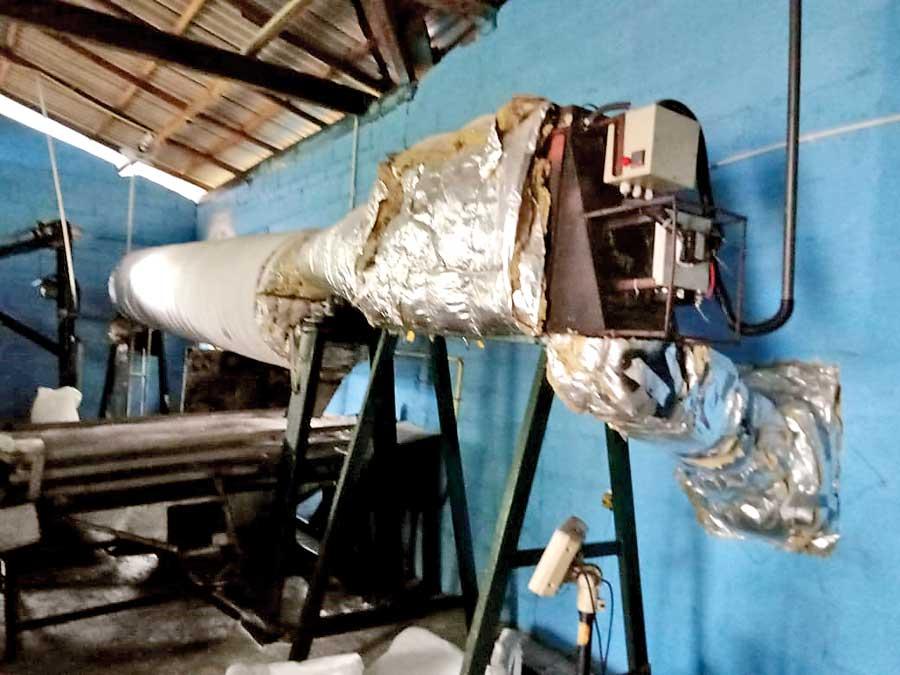
A salt crushing machine similar to the one fixed at the saltern which is now at the storehouse maintained by the close associates of Lanka Salt Ltd Chairman
Soon after this incident the CAA has conducted another raid following information received that a lorry carrying 20 tons of salt on June 6 to K. T. R. Traders in Kalmune has changed its location from Kalmune to Sitinamaluwa Pasal Mawatha area in Hambantota. It has been confirmed that the said stock has been taken to a salt storage facility belonging to an associate of the LSL Chairman. The CAA has asked for the services of LSL internal Audit Officers for the raid, but the LSL Chairman had called for an urgent meeting with the intention of keeping the Audit officers locked in a room. However, another officer had unlocked the doors allowing the Audit officers to take part in the raid. (This newspapers is in possession of evidence to prove these facts)
The said stock has contained table salt and is an expensive variety used in the production of biscuits and other food items. Lorries loaded with the said stock have been delayed in the saltern as the accountant hasn’t given his approval to issue salt to K. T. R. Traders in Kalmune on a loan basis. Despite the odds the stock has been issued eventually. The storekeeper has recorded in his logbook that the stock has been issued on the instructions of the Production Manager as informed by the Chairman, after receiving instructions via a call made to him.
Letters of demands issued
Despite the LSL Chairman informing the internal Audit Officers to refrain from taking part in the raid, they were involved in the raid. Letters have been issued by the chairman to them inquiring reasons for taking part in the raid without informing him. In those letters he has inquired on whose permission the officers have participated in the raid and the reason for taking photographs of the recently imported salt processing machine during the raid. According to sources, a machine similar to the table salt processing machine in Hambantota saltern has been set up in the said location. It is the responsibility of the authorities to investigate the machine. Hambantota CAA officers have requested the LSL Audit officers to participate in the raid as their presence is required when taking measures regarding a raid. The Audit officers said that during an investigation regarding a fraudulent activity connected to the saltern, there is no need to inform the Chairman prior to visiting the relevant location. The Chairman has not given a positive response and has issued letters inquiring reasons for their involvement.
"The said stock has contained table salt and is an expensive variety used in the production of biscuits and other food items"
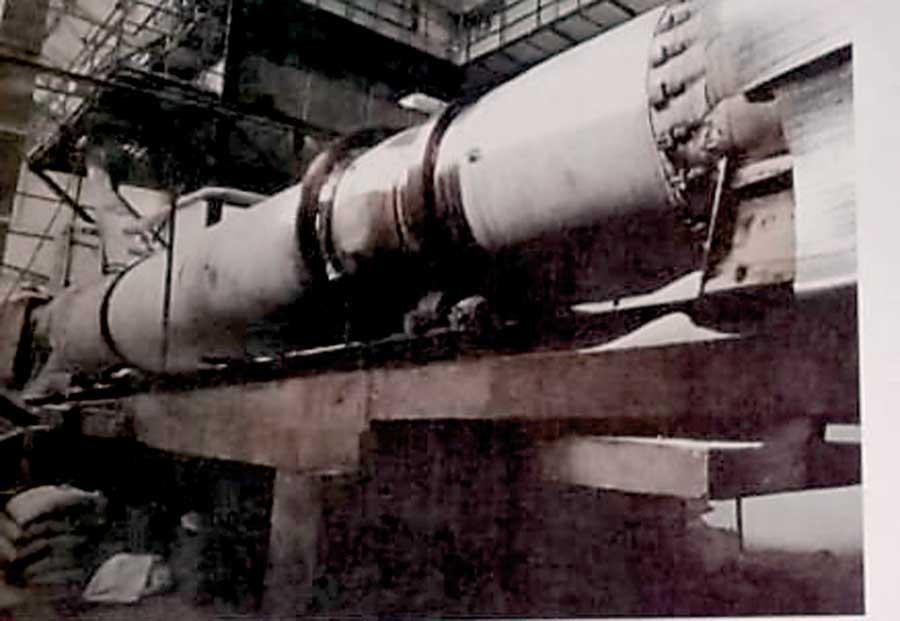
A picture of the salt crushing machine fixed at the Hambantota saltern
The location where the stock of salt has been loaded is not registered under Hambantota saltern and is not permitted to receive or store salt. The instructions in the Extraordinary Gazette No 1376/9 dated 19/01/2005 related to the Food Act on labelling food items clearly explain that aspect. That Gazette is in effect relating to the operations of the saltern. According to the Food Act a salt storage should meet the requirements to store salt and must be registered under the saltern. The basis on which salt has been stored in the particular location disregarding set guidelines should be brought to attention.
 The owner of Kalmune K. T. R. Trading Agency said that salt billed under his name are packeted at a place in Sitinamaluwa. But that is not possible with the rules followed in the saltern. Those who are engaged in the salt industry should meet certain requirements such as the capability to store, availability of facilities and machines to packet if they are to get the opportunity to sell salt. Those who sell packeted salt abide by another set of rules. The Accountant of the saltern confirmed that it is illegal to store salt stocks sent to one address at another place.
The owner of Kalmune K. T. R. Trading Agency said that salt billed under his name are packeted at a place in Sitinamaluwa. But that is not possible with the rules followed in the saltern. Those who are engaged in the salt industry should meet certain requirements such as the capability to store, availability of facilities and machines to packet if they are to get the opportunity to sell salt. Those who sell packeted salt abide by another set of rules. The Accountant of the saltern confirmed that it is illegal to store salt stocks sent to one address at another place.
The amount of salt required in each area is determined based on the population density of each area. Agencies in different areas can sell only the amount needed and cannot sell salt in other areas as there are other agencies to distribute salt to those areas. There is a specific number placed on salt packets which helps in locating the area from which the packets came from. If salt stocks are lost in an area, a shortage of salt may occur.
"When salt stocks demanded by each area do not arrive it creates a shortage and leads to an increase in price"
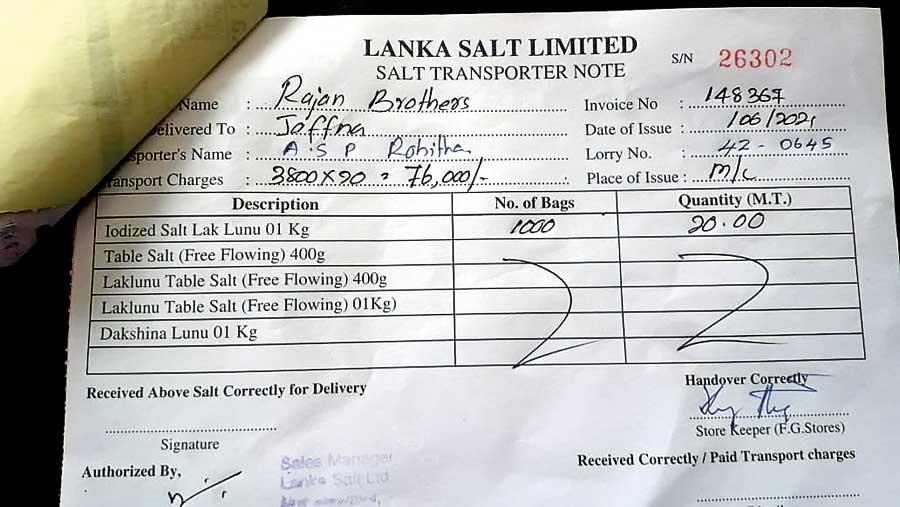
The receipt of the stock of salt transported to Jaffna
When salt stocks demanded by each area do not arrive it creates a shortage and leads to an increase in price. Conducting a visit to Hambantota saltern Trade Minister Bandula Gunawardena hinted about an effort to sell one kilo of salt at 100 rupees. This matter should be brought to light, considering the current situation in the saltern.
The owner of Kalmune K. T. R. Trading Agency acknowledged that table salt stocks were packeted in a storage in Sitinamaluwa as he had no place to do so. He said that he did so as it was not practical to send back the salt stocks after bringing them to Kalmune. When considering the opinion of the accountant on this matter it is obvious that the agency has violated the methodology stipulated for salt distribution. This issue would not have arisen if the salt stock had been sold in Kalmune. Instead, after billing the agency for the stock of salt, in Kalmune, it has been taken to a store in Hambantota leading to a raid by the CAA. Salt is a food item and the Hambantota saltern is fully responsible for its cleanliness. When salt stocks are stored in other places who should take the responsibility for its quality?
LSL Chairman Sandabarana told the electronic media that salt had been sent to the said places to help two youth (introduced by him as his associates) engaged in the salt industry. However the claim made by the agency owner is contradictory.
This newspaper is in possession of a copy of a letter issued by the LSL Chairman and addressed to M. M. S. Mujibar, who made a request to obtain table salt and salt to manufacture dried fish. The letter says that if salt is used for other purposes rather than for those purposes it is requested for a copy of the permit issued by the Food Commissioner to store and transport the stock should be handed over to the LSL Chairman. If this condition is not met salt will not be issued. The Audit officers and the CAA Raid Officers said that the close associates of the Chairman didn’t possess such permits issued by the Food Commissioner.
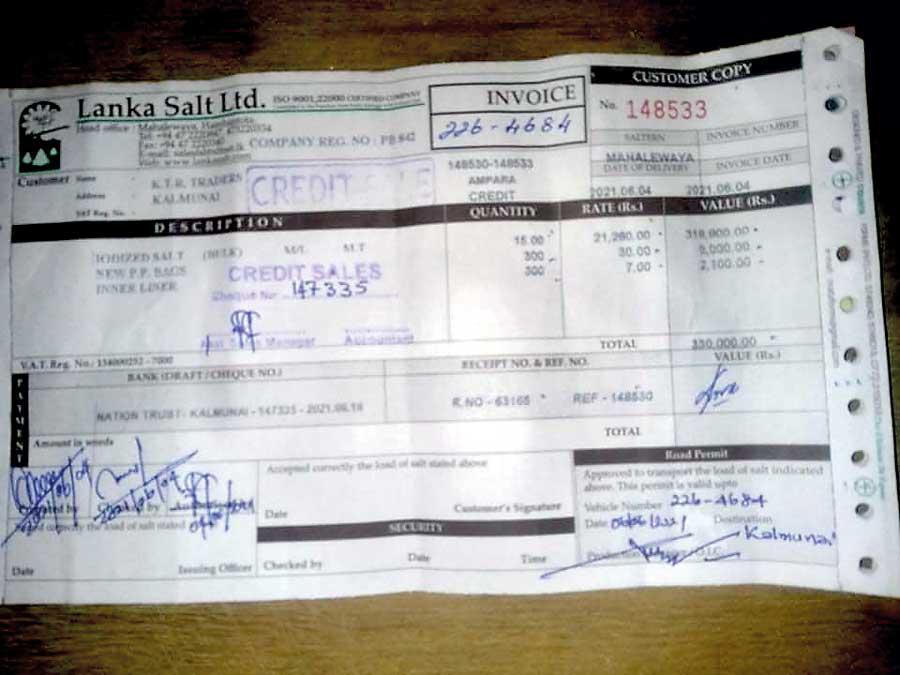
The receipt of the salt stock which was sent on credit to Kalmune
Banned from entering saltern
Issuing a letter on January 20 addressed to Ravi Anderson, one of the mentioned youth, the Chairman says that table salt, iodine salt, and dried fish salt would be issued with effect from January 23 following a decision and approval of the management. However in July, the Board of Directors of the saltern take a decision prohibiting the youth from entering the saltern. This was after it was revealed that they are involved in deciding the prices of salt stocks and influencing the sale of salt in the saltern. As a result issuing salt to them was halted. The security logbook in the gate indicates that these youth have visited the Chairman’s official residence on at least for three days of the week. Issuing salt stocks, billed to other people, and releasing them to individuals not connected or registered with the institute shows that the operating system is flawed. The officers who conducted the investigation had been requested to provide explanation. CAA officers stationed in Hambantota have conducted a raid following information received with the participation of the LSL Audit officers. The LSL Chairman has exerted an influence on the Audit officers who have taken part in the raid.
"90% of the shares of the saltern is under the purview of the Employees Trust Fund"
K. Padmathilaka, a businessman from Hambantota engaged in salt industry for 25 years, opined that salt cannot be loaded or transferred to other locations disregarding specifications in the bill. “I do not know if the Chairman has changed the rules according to his wishes. There is a mafia in the salt trade in Hambantota because of his associates and even I cannot buy salt directly from the saltern. I have enough proof for that.” he added.
90% of the shares of the saltern is under the purview of the Employees Trust Fund. On October 17, 2019, the Attorney General informed the authority of the saltern that its operations should be carried out as per government’s official documents and circulars because according to the 19th Amendment to the Constitution more than 51% of the shares are owned by the state sector. The Board of Directors appointed in 2020 has agreed to this, but the Chairman has not offered any support, members of the board said. So far five members of the board as well as the Chairman of the ETF have resigned.
"So far five members of the board as well as the Chairman of the ETF have resigned"
The ETF Chairman is said to have informed the President, Prime Minister and the Secretaries on all matters regarding his resignation. The ETF has informed the Finance Ministry to have the 90% shares vested back under their control and an estimate would decide whether the shares would be vested to the private sector or the state sector, the Board of Directors said.
Sandabarana acknowledged that Ravi Anderson was an associate of his and 20 tons of salt dispatched to Kalmune were stored in a place in Sitinamaluwa. He said that salt obtained by an agency to packet the content cannot be sold outside the specified area and salt stocks can be billed to any address, distributed and stored anywhere in the country. He also acknowledged that when the accountant opposed to issue salt to the Kalmune agency on a loan facility he intervened and gave permission. “ETF Chairman has written to the President and the PM using false details that give a distorted view of how the saltern is operated. I have those letters with me,”Sandabarana said.
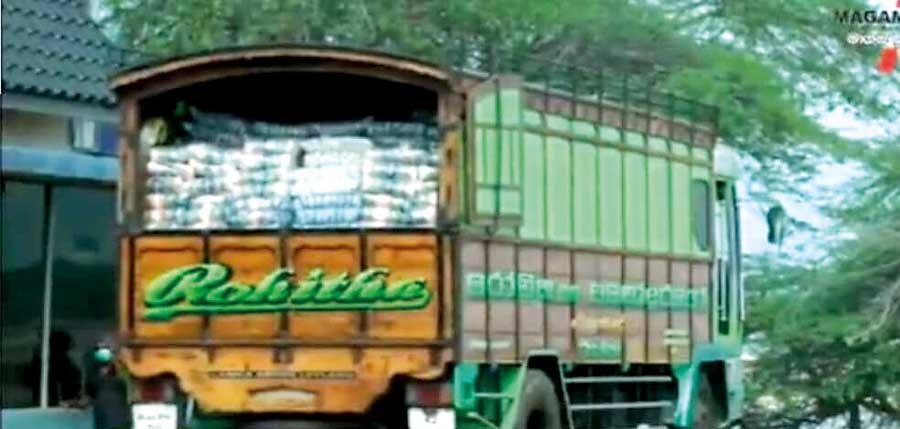
The lorry that took salt to Jaffna
Writer threatened
When asked about the claims made by the agency owner and about violating the rules, Sandabarana’s response was not pleasant and he started hurling insults at this writer and claiming that journalists should be put in their place by the social media. He ended the telephone conversation by issuing this writer with a threat.
ETF Chairman Sriyanda Silva Wijerathna said that this issue has been going on at the saltern for a long time. “As the issue is being discussed at present I cannot make any statement on further decisions regarding the saltern. I have explained to the relevant authorities providing details and I expect a proper solution soon. I cannot reveal to the media whether the shares under the ETF would be withdrawn as it is an internal matter. I learned about the CAA raids, but know nothing more than that.” he added.
Attempts made to contact CAA Chairman proved futile. An officer at the CAA head office said that an internal investigation is in progress regarding the raid at the saltern on the instructions of the President. He has instructed to check where salt stocks are taken, stored and whether they are taken to the given locations and to take legal actions against whoever is guilty disregarding their status.
24 Nov 2024 5 hours ago
24 Nov 2024 7 hours ago
24 Nov 2024 8 hours ago
24 Nov 2024 9 hours ago